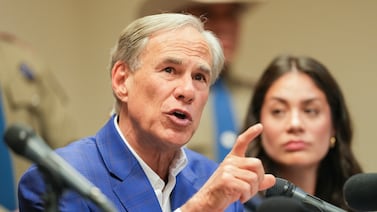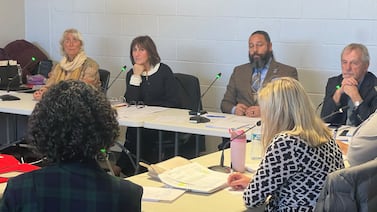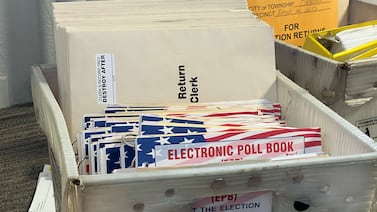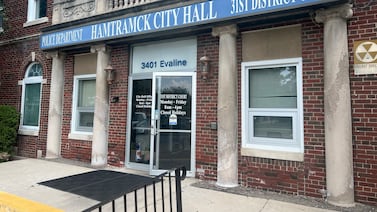Votebeat is a nonprofit news organization reporting on voting access and election administration across the U.S. Sign up for Votebeat Arizona’s free newsletter here.
Some of the 200,000 longtime Arizona residents who were mistakenly never asked to provide proof of citizenship when they registered to vote could eventually be kicked off the voter rolls entirely, if a legislative proposal moves forward.
GOP state Rep. Alex Kolodin’s proposal, under House Bill 2038, addresses calls from county recorders for clarity on how they should address these voters’ eligibility. The recorders have been seeking the help since last summer, when state officials announced the problem, and some have criticized Secretary of State Adrian Fontes, a Democrat, for not providing more guidance.
Under Kolodin’s proposal, which he explained at a House committee meeting Wednesday, if the recorders ask these voters for citizenship proof but they fail to provide it within 35 days, their status would be put in limbo. If they attempt to vote while in that limbo status, they would have until 7 p.m. on Election Day to provide the citizenship proof for their ballots to be counted.
But if recorders still don’t have the proof after the next general election in 2026, they must cancel the voter’s registration, the bill says.
Fontes’ office and voting rights group All Voting is Local Action immediately objected to Kolodin’s legislation, saying the voters should still be eligible to vote in federal elections, even if they don’t provide citizenship proof. Arizona requires this proof to register to vote in state and local elections, but to be on the rolls for federal elections, voters only need to attest to their citizenship under penalty of perjury.
A majority of county recorders were in support of Kolodin’s proposal Wednesday, but they are now discussing if it’s really the right way forward.
The recorders need a resolution soon. A few counties have all-mail local elections scheduled in March or May, and some have already started sending notices to affected voters. But others have held off while they await instructions, meaning many affected residents don’t yet know that they are on the list of people who need to provide citizenship proof.
The voters affected by the state mistake have all lived in the state since before 1996 and registered to vote after 2004. They were never asked for their citizenship proof because of errors in the state’s driver’s license and voter registration systems. All sides agree that most of them, if not all, are probably U.S. citizens, and that the problem isn’t the voters’ fault.
All sides appeared to be on the same page about how to address the problem when it was initially announced last summer. They quickly asked the Arizona Supreme Court to put the requirement on hold for affected voters until after the November election, and let all of them vote a full ballot of federal, state, and local elections. But politics, along with confusion over state law and the court’s order, appear to be complicating the solution.
The assumption among the various parties last summer was that county officials would give affected voters a chance to provide proof of citizenship, and if they failed to do so, move those voters to the federal-only list, like other voters in the state who don’t provide it when they register.
The state Supreme Court ruled in September that the state shouldn’t require them to provide citizenship proof for the November election. But now that ruling is adding to the confusion. It cited state law when explaining how election officials should determine eligibility, but it didn’t provide specifics on how to move forward.
State law on the topic is itself a bit unclear.
The lack of clarity comes mostly from a pair of 2022 voter citizenship laws that limited voting eligibility for people who didn’t provide citizenship proof and required more frequent citizenship checks. The laws were immediately challenged by voting rights groups, and some parts of them are still the subject of ongoing court cases.
One part of those laws, which the U.S. Supreme Court affirmed last summer, says that if an Arizona resident registers to vote using a state voter registration form — rather than the federal one — and doesn’t provide citizenship proof, county recorders must reject the registration altogether. Previously, those registrants were added to the rolls as federal-only voters.
What’s still not clear is whether that law applies just to new registrants, or also to the 200,000 voters caught up in the system errors.
After Fontes’ office found out about Kolodin’s proposal, General Counsel Amy Chan sent a letter Wednesday to counties attempting to clear up the office’s stance.
If the affected voters do not provide the documentation, Chan wrote, they should “be relegated to federal-only voters (as they would have been had the [Motor Vehicle Division] system functioned as intended and [documented proof of citizenship] has been requested and obtained at the appropriate, original time).”
At Wednesday’s committee hearing, George Diaz, Fontes’ government relations director, told the committee that it would be confusing for voters to get kicked off the rolls completely over the proof-of-citizenship requirement.
Natalia Sells of Arizona’s All Voting is Local Action, the voting rights organization, said that doing so would violate a past federal court settlement on the topic, and violate equal protection laws. She urged the committee to uphold the voters’ right to vote.
But after the meeting, Kolodin told Votebeat that he interprets the Arizona Supreme Court’s September ruling about the 200,000 voters, and its reference to state law, to mean that they can be kicked off the rolls.
Jen Fifield is a reporter for Votebeat based in Arizona. Contact Jen at jfifield@votebeat.org.





